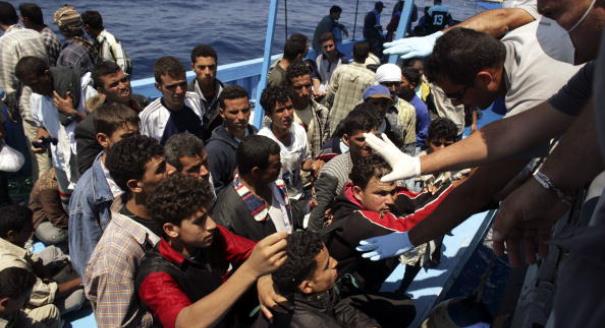European leaders hardly needed a summit to agree on how to cope with the thousands of refugees who are trying desperately to reach the shores of Europe.
After a brief lull during the winter months, refugees from North Africa have begun again risking their lives and spending their savings to be taken across the Mediterranean. In rickety boats organized by traffickers, thousands of young and old set off from Libya to escape misery, war, conflict, and oppression.
Now, pushed to the point of shame by the drowning of as many as 700 migrants during the weekend of April 18–19, EU leaders agreed to hold an emergency summit on April 23. It is as if previous drownings didn’t have the impact to make a difference.
Prior to the summit, the level of debate was so shortsighted that it exposed the severe limitations of the EU’s soft power and its ability to even do crisis management. There were suggestions that the EU should deal with the refugee crisis by military means. After all, it was argued, if the ever-growing turmoil in Libya is one of the reasons for refugees to leave the country, then some kind of military option should be considered.
Such an idea has been dismissed by several EU member states. And just as well. The way in which a UN-sanctioned NATO mission conducted a bombing campaign in Libya in early 2012 unleashed untold damage not only in Libya but also throughout the region.
Yes, the Libyan tyrant Muammar Qaddafi, feted during his reign by several European leaders (but not German Chancellor Angela Merkel), was overthrown as a result of the military campaign. But NATO never considered the day after his downfall.
There was a brief honeymoon after the NATO mission, but the calm was then followed by intense conflict fueled by ethnic rivalries and militia groups unable and unwilling to make the leap to even think of establishing strong political and economic institutions.
But the unfolding of the Libyan crisis was and is only the tip of the iceberg.
The demise of the Qaddafi regime had huge repercussions for the Sahel, in particular Mali. Malian Tuareg fighters who had acted as Qaddafi’s mercenary forces returned to their country. Flush with weapons, they contributed to destabilizing Mali in their bid for independence for the northern part of the country. The intervention of France in January 2013 put a halt to the disintegration of this former French colony and its takeover by radical Islamic forces.
The collapse of stability in Libya has had another impact on the region—as if EU leaders needed any reminding of the political nature of the regimes in North Africa. Over the years, refugees fleeing repressive regimes in Ethiopia, Eritrea, and Sudan often tried to use Libya as a conduit to Europe. Qaddafi did Europe’s bidding. He ensured that Libya’s borders would be kept secure.
That security, compounded by the war in Syria, has long since gone.
In short, for European leaders, the issue is not only the upheaval in Libya. It is also the appalling state of human rights, the political repression, and the lack of any economic perspective for many in the region. These factors have been driving thousands of people to leave and find a new life and safety in Europe. So suggestions of using military means against the traffickers would not address the roots of the issues.
If European leaders do not understand the nature of these migration flows, then their soft power instruments and their ability to conduct crisis management are meaningless. This leaves EU leaders having to come up with a declaration during their summit on April 23.
Italy has already said it can no longer cope with the influx of refugees. It recently disbanded Mare Nostrum, an Italian-led search-and-rescue program established in October 2013, for lack of funds. The operation was replaced by a smaller, EU-led mission. That has been ineffective in preventing the drownings or in stopping the traffickers, an issue that EU leaders will discuss during their meeting.
Assisted by traffickers, by the end of 2014, 627,000 people reached EU countries and applied for asylum. Germany is dealing with 203,000 of these applicants, according to the International Organization for Migration. Germany and Italy as well as Malta and Sweden are calling for more solidarity among all EU countries. In practice, that would mean each country taking its share of the refugees.
But here comes the crunch. With populist parties opposed to immigrants and gaining support as a result, it is going to require enormous leadership by all EU governments to explain to their citizens why European states should provide refuge or asylum to migrants.
Some countries, led by Germany, Sweden, and Malta, have been at the forefront in explaining to their publics about the need to share the comfort zone that Europeans have become used to. Instead of perceiving refugees as puncturing that zone, Europeans should extend it to those in dire need of security.





.jpg)
